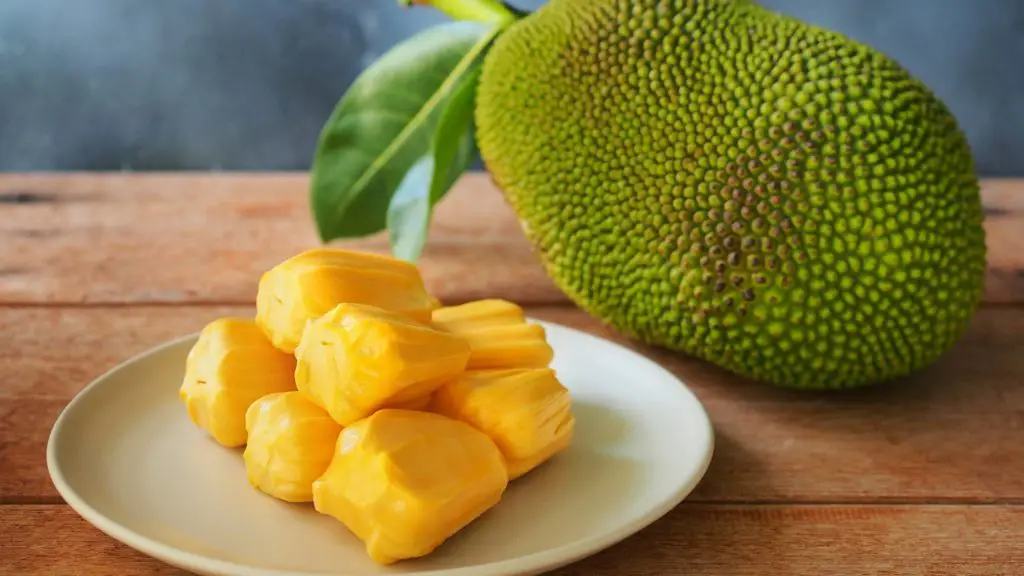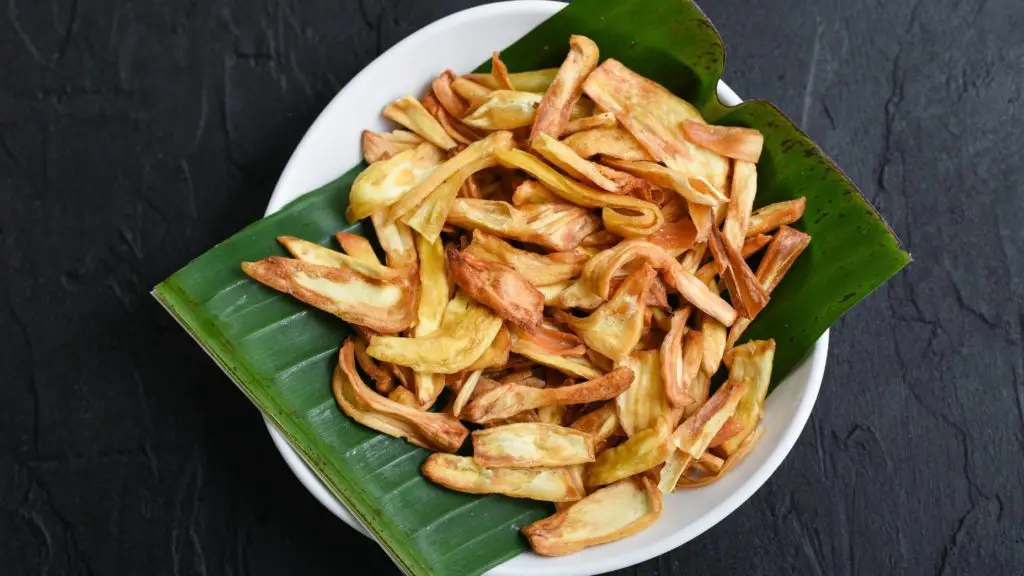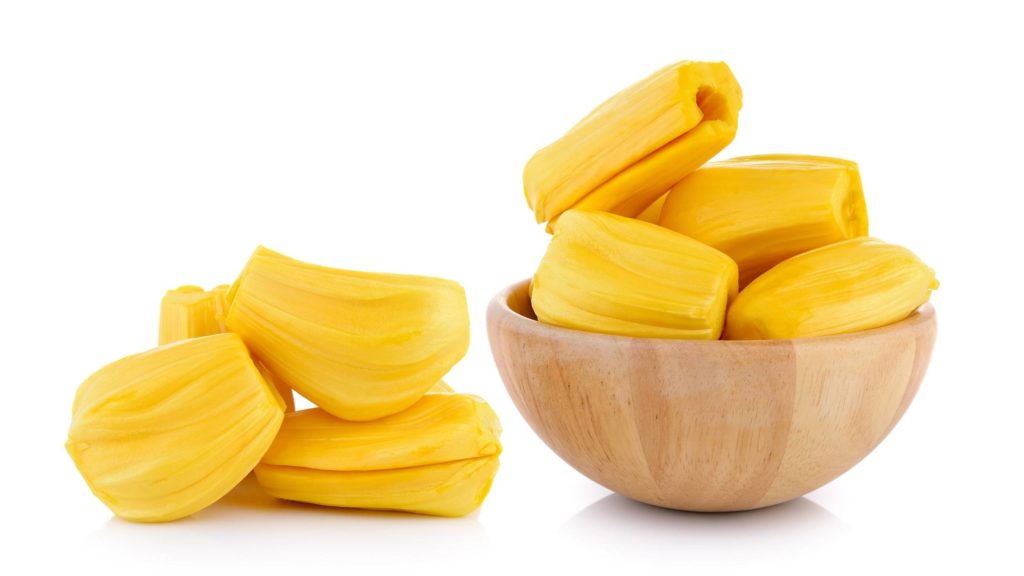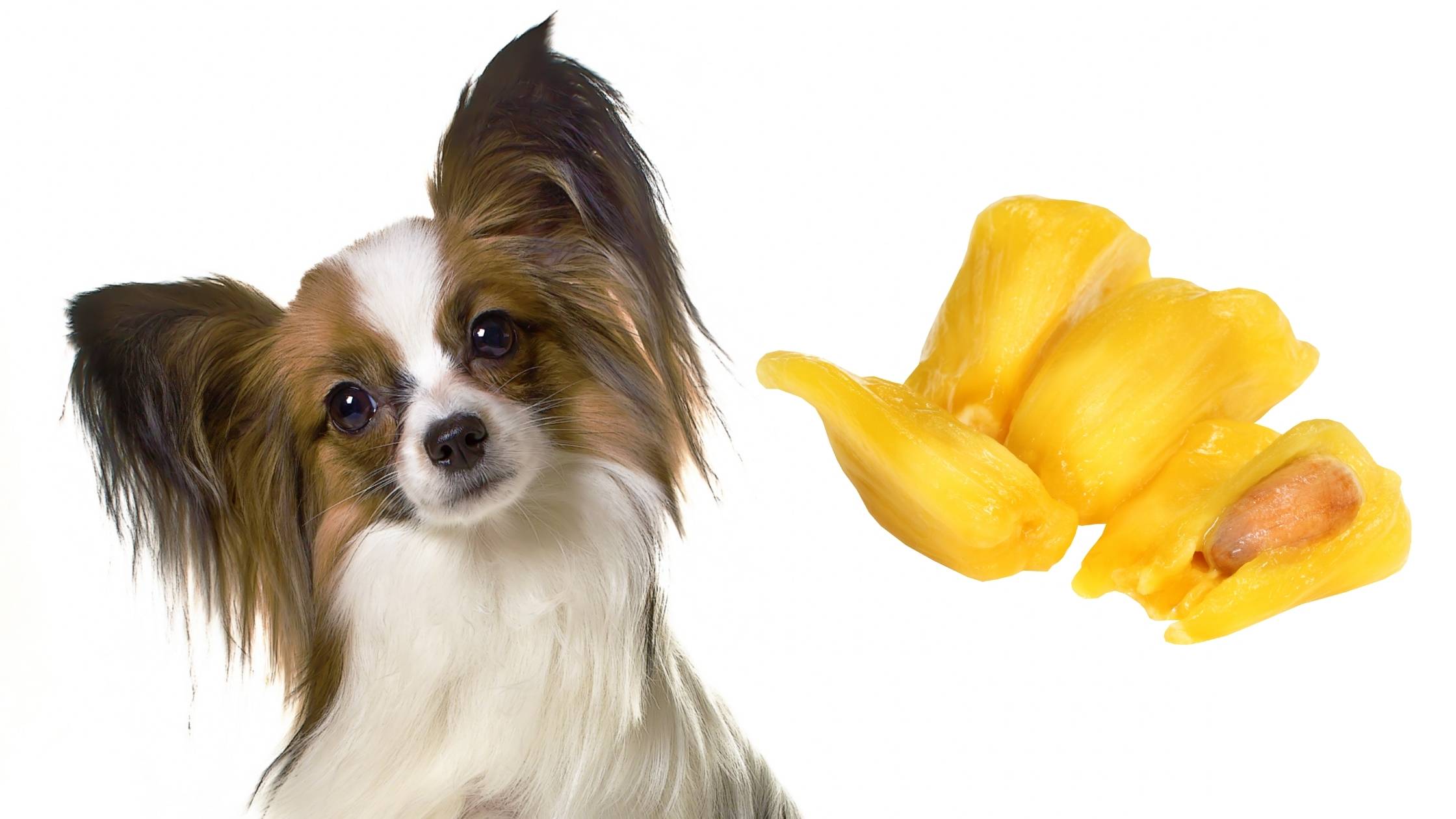Last Updated on 12/02/2021 by Veronica Jones
People love to eat jackfruit. Whether it’s raw or cooked, eaten on its own or in a curry, this Asian fruit contains many nutritional benefits for humans.
As a loving dog owner, you may be on the hunt for new and nutritious treats for your furry friend, but can dogs eat jackfruit too? Is it safe? What are the risks and benefits?
Here’s everything you need to know about jackfruit and dogs.
What is jackfruit?
Before we answer the question ‘can dogs eat jackfruit’, let’s learn more about this unusual fruit first.
Jackfruit is a new variety of tropical fruit that is grown in Africa, Asia and South America. It’s a large fruit that can weigh up to 40 pounds. People use jackfruit as a meat replacement because it has a similar texture to pulled pork. Unripe jackfruit has a savoury, plain taste while ripe jackfruit takes fruity and sweet.

Can dogs eat jackfruit?
Unfortunately, it’s not known whether jackfruits are safe for doggy consumption yet. The fruit is relatively new to humans, which means the information available on this food is limited. If dog owners want to give their pup jackfruit, it’s best to do so cautiously as there is no evidence to suggest whether it is safe or dangerous to dogs.
Can dogs eat jackfruit seeds?
No, dogs should never eat raw jackfruit seeds. One thing we do know about this new addition to the fruit bowl is that like most fruit seeds, a jack fruit’s seeds can be very dangerous for dogs if consumed. They contain a substance that is highly toxic to dogs.
The seeds of a jackfruit fruit are quite large, which puts your dog at risk of choking on them if consumed. If your dog ate jackfruit seed and shows signs of choking, you will need to start performing the Heimlich Maneuver. Signs that your pooch may be choking include behaving erratically and coughing, breathing harder or faster than normal, pale or blue gums or gasping for breath.
Jackfruit seeds could also cause intestinal blockage in dogs, which is why it’s important to make sure your pooch isn’t given the opportunity to gobble them up. Dogs may also experience constipation, vomiting and a loss of appetite from eating jackfruit seeds.
Keep your pup safe by keeping jackfruit seeds well away from him.
Can dogs eat jackfruit flesh?
Jackfruit flesh contains a substance called latex, which is white and gluey. This can be dangerous to dogs, especially those with eczema or other skin allergies. You should always remove the latex before feeding the flesh of a jackfruit to your dog.

Can dogs eat cooked jackfruit?
Whilst there is not yet proof that dogs can’t eat jackfruit, dog owners should pay attention to how the fruit is cooked if giving cooked jackfruit to your pup. This tropical fruit is commonly cooked in spices such as soy sauce, onions and garlic which are all harmful to canines.
Soy sauce – canines should not eat soy sauce because it contains high levels of sodium. Excessive salt intake in dogs can cause salt poisoning and kidney failure if consumed in large amounts. Kidneys remove toxins from the blood and excrete them via urine. These vital organs also regulate blood acidity levels and blood pressure.
Symptoms that could indicate kidney failure in your pup include:
• Drinking less or more water
• Excessive urination
• Decreased appetite
• Weight loss
• Blood in urine
• Pale gums, bad breath or mouth ulcers
Onion and garlic – are both common ingredients to cook with jackfruit. They belong to the Allium family of herbs, which are highly toxic to dogs. Excessive salivation, mouth irritation, vomiting and diarrhea may be early signs of toxicity in dogs. The most dangerous part of these herbs can damage your pup’s red blood cells, preventing oxygen from being carried around his body. A rapid heart rate, panting, weakness and discoloured urine are all signs that your dog has eaten something he shouldn’t and an emergency trip to the vet is required.
Can dogs eat jackfruit pulp?
If you’re going to give any part of a jackfruit to your pet, the pulp is the safest part. However, this doesn’t mean that your dog won’t react to it. There are so many uncertainties around jackfruits and doggy consumption that pet parents should be cautious about letting your dog eat jackfruit. In theory, dogs can eat the pulp of this tropical fruit either raw or cooked, however canines may struggle to chew and digest unripe jackfruit pulp.
Can dogs eat jackfruit chips?
Whilst a small amount of jackfruit chips may not cause significant harm to your pup, they usually contain seasoning or other products such as oil which can damage a dog’s health if eaten excessively. Salt can be toxic to dogs. Their digestive systems can’t digest it in the same way as a human’s body can. The consumption of salt in large quantities could cause health issues such as digestive and kidney problems.
Salt poisoning in canines should be treated as a medical emergency. In rare cases, it can even be fatal.
Symptoms of salt poisoning in dogs:
• Stomach pains
• Loss of appetite
• Swollen tongue
• Vomiting
• Diarrhea
• Convulsions
• Extreme thirst and urination
• Muscle spasms
• Loss of energy and appetite
• Difficulty breathing

Can dogs eat jackfruit rind?
No, dogs should not eat the rind of a jackfruit because it’s extremely hard and has a spikey texture which makes it very hard for a dog to digest. Jackfruit rind could easily cause an intestinal blockage, which is a serious and life-threatening condition in canines. If you think your pooch has a blocked intestine, take him to your veterinarian immediately. The rind of a jackfruit is so tough that it also poses a choking hazard for dogs and should be avoided.
Can dogs eat dried jackfruit?
Whether dogs can eat dried jackfruit will depend on how the fruit is dried. Dried fruit usually contains added flavors, preservatives and sugar that could be unhealthy or even toxic to your pup. Preservatives have been linked to damaged blood vessels and renal disease in dogs and should not be consumed.
What happens when a dog eats jackfruit?
The exact reaction from a dog eating jackfruit is unknown and some dogs may react differently to others.
Allergic reaction
As with all new foods, monitor your dog closely for any signs of a reaction after he has eaten jackfruit. Vomiting, diarrhea, skin irritation and rashes are all common signs of a food allergy in canines. If you see any of these symptoms, don’t give your pooch any more jackfruit. If you’re concerned that your dog is behaving out of character or showing signs of an allergic reaction, contact your veterinarian immediately.
Intestinal blockage
The seeds and rind of a jackfruit could cause an intestinal blockage in dogs.
Signs that your pup may have a blocked intestine are:
• Vomiting
• Diarrhea
• Straining
• Lethargy
• A lack of appetite
• Burping or drooling
• Abdominal pain
• A bloated or swollen stomach
Your veterinarian may suggest a scan or X-ray to check for any blockages before considering different treatment options depending on the severity of the blockage.

What are the health benefits of jackfruit?
Jackfruit is a good source of essential vitamins and minerals for humans, however it’s not known what effect it has on a dog’s body.
This tropical fruit does contain fibre, vitamin A and C, which has the following benefits for canines.
Fibre – will keep your dog’s digestive system working, however eating too many of them could make your pup vomit and experience diarrhea.
Calcium – essential for the development of your pup’s bones and teeth, and jackfruit is bursting with this important nutrient.
Magnesium – promotes strong and healthy bones.
Potassium – a vital mineral to your pooch’s heart health because it regulates the heartbeat, and lowers cholesterol. Hypokalemia is a condition where a dog’s potassium levels are low, affecting the functioning of the heart, nerves and muscles. If your dog shows signs of lack of appetite, muscle pain, loss of muscle mass, paralysis of the muscles, vomiting or lethargy, speak to your vet immediately.
Vitamin A – essential for a dog’s skin, coat, muscles and nerves to function correctly. A lack of vitamin A can cause unhealthy looking skin and coat and muscles will start to deteriorate, leaving your dog feeling weak. Vitamin A is even more important for pregnant females to help the puppy’s growth and development.
Vitamin C – helps your canine maintain a strong and healthy immune system. Vitamin C also contributes to good overall health and reduces the risk of infections, diabetes and even some types of cancer.
Low in calories – A jackfruit is low in fat and calories, which means you won’t need to worry about your pet gaining weight from eating this tropical fruit.
Is jackfruit poisonous to dogs?
There is no evidence to prove that jackfruit is poisonous to dogs. If you want to share some jackfruit with your pup, speak to your vet first. Vets will have access to the latest knowledge and research on dogs and jackfruit.
How to prepare jackfruit for your dog
If you decide to let your dog try some of your jackfruit, here are some steps to take to reduce the risk of the fruit causing your pup harm. If your dog is eating jackfruit for the first time, only feed him a small piece and observe his behaviour and reaction over the next 24 hours to make sure he doesn’t react negatively. Vomiting, diarrhea and bloating are common signs that your pup shouldn’t be eating jackfruit.
1. Remove the skin. The skin is tough and bumpy and could cause damage to your pet’s mouth, stomach and gut.
2. Next, remove the latex as dogs can be sensitive to it and even suffer from a reaction after coming into contact with it.
3. Take out the seeds. Jackfruits contain a large amount of large, hard seeds that can damage a dog’s teeth and even cause choking or an intestinal blockage.
4. Baking jackfruit in the oven without any seasoning or added preservatives will make the flesh softer and easier for a canine to eat.
5. Jackfruits are large, so you should always cut the flesh up into small bite-sized pieces before serving them to your dog.

Jackfruit and dogs
If you do decide to let your pup try jackfruit, only give a small amount and observe your pet’s reaction closely after consumption. It’s not advised to let your doggy friend try jackfruit if he has any other allergies.
Remember to remove the rind and seeds as these are harmful to canines. If your four-legged friend shows any concerning signs after eating jackfruit, contact your veterinarian immediately for advice. Overall, you should ask yourself whether giving your dog jackfruit is worth the risk. Every dog is different and some may react differently to others after consuming jackfruit.
Looking for More Great Articles About What Your Dog Can (or Can’t) Eat?
- Can Dogs Eat Persimmons? Are they Dangerous?
- Can Dogs Eat Mulberries? Are they Safe for Dogs?
- Can Dogs Eat Dragon Fruit? Everything You Need to Know
- Can Dogs Eat Pomelo Fruit?
- Can Dogs Eat Jicama? Is it Safe?
- Can Dogs Eat Acai (Berries or Bowls)? Is it Safe?
Reference list
- Pet MD “what to do if your dog chokes” https://www.petmd.com/dog/emergency/common-emergencies/e_dg_choking Accessed 29th November 2021
- Pet Poison Helpline “garlic and dogs” https://www.petpoisonhelpline.com/poison/garlic/ Accessed 29th November 2021
- VCA Hospitals “kidney failure in dogs” https://vcahospitals.com/know-your-pet/kidney-failure-chronic-in-dogs Accessed 29th November 2021

